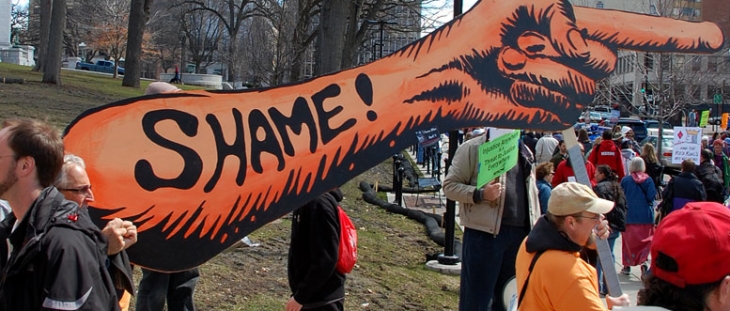
 (Photo: Some rights reserved by OnTask) At the final all-candidates’ debate in my riding last month, the conservative candidate, Kirk Russell, didn’t show. Russell, “a former carpenter [who] currently owns a construction company,” had never represented the area before, and he had really no chance of getting to do so this time. The moderator placidly announced to the room that the candidate wasn’t going to be able to make it. “Shame!”, someone in the audience barked, and then someone else did, and then someone else, like three unwanted exclamation points at the end of a sentence. In public discourse today, “Shame!” is less a thing you feel than a thing you yell at someone or something: those cops over there, that bank you’re marching by, that politician, or whichever embodiment of power to whom you’re speaking your truth–Shame! (The subsequent “…on you,” once yelled to complete the sentence, is now usually implied.) Whenever there’s communal anger, or when a person believes that his or her anger is communal, there’s “Shame!” As with many things in crowds, it’s contagious. By my count, the small group of students in this short video yell “shame!” 221 times as University of Toronto police end that group’s “occupation” (the students’ word, not mine) of a campus building three years ago. Every police officer who was stationed on the margins of the protests that came after last year’s G20 summit must have had that word chanted at them at least as many times. “Shame!” can quickly devolve from reaction to reflex, and often does. On Occupy Toronto’s first day, a native activist and the crowd around him at St. James Park got into something like a call and response: “Why is it that we have to break the law in order to be heard today in our territories?” he asked them, and a handful replied “Shame!” And so on, again and again, until he was finished speaking. The pattern was well-established by the time a middle-aged woman took the megaphone. “I never needed money from the government until my son was diagnosed with autism,” she told the crowd. “Shame!” a few in the audience shouted, a few sentences too soon. Here’s the thing about yelling “Shame!”, though: it never really works, because it can’t. To understand why, it helps to understand “FAIL.” By “FAIL,” I mean the internet’s rejigged version of the word, a supposed-to-be-funny way to dismiss something wholesale by pointing to its perceived flaws. (This is pretty much always done from behind a computer screen.) Here’s a “Balancing Act FAIL,” and here’s a “Securing Your Armoire FAIL.” Some marathon runners lagging well behind others? FAIL. Airline’s website redesign not up to your standards? That’s a FAIL, too. What “shame!” has in common with “FAIL” isn’t the intent behind its expression, but the effect that expression has. As Anil Dash argued in a blog post back in 2009, people who deploy “FAIL” “choose a reflexive shorthand instead of a reasoned critique, and they bring out the worst in a community.” Later, he’d tell the New York Times that “‘FAIL’ isn’t advocacy; it’s the tool of those who don’t know how to be advocates, who don’t know how to persuade… It puts the ego of the complainers ahead of the cause they’re trying to advocate.” Replace “FAIL” with “Shame!” and that still sounds about right. While “fail” usually captions a photo of, say, someone falling down (balance FAIL!!!), the similarly dismissive “Shame!” is much worse precisely because the stakes are much higher. Poverty, globalization, aboriginal rights, education, health care, abuses of power in all its forms: these are all very important things, and each warrants some measure of attention, anger, and, most importantly, discussion. The moment you start shouting “Shame!” is the moment that the conversation ends. After all, it’s not a word you talk–it’s one you yell. It’s distinctly undemocratic. Even worse, “Shame!” doesn’t only drown out dissenting voices; it can turn off those who might otherwise agree. I have more in common with the majority of protesters who take to the streets here than I have differences. I agree that police went way too far during the G20 summit, and that those most responsible haven’t yet answered for it. (I’ve marched for that one.) I agree that the growing disparity between the rich and the poor here is a big problem. I dig unions. I don’t especially like what our mayor or prime minister are up to. And I believe deeply in the Charter that guarantees your and my rights to take to the streets and say all that. But show me a protester screaming “Shame!”, and I’ll show you someone who all of a sudden feels more than a little awkward siding with them, and someone else on the other side whose stance just calcified. Especially when your message is one that deserves to be listened to, that’s a real… well, you know.
(Photo: Some rights reserved by OnTask) At the final all-candidates’ debate in my riding last month, the conservative candidate, Kirk Russell, didn’t show. Russell, “a former carpenter [who] currently owns a construction company,” had never represented the area before, and he had really no chance of getting to do so this time. The moderator placidly announced to the room that the candidate wasn’t going to be able to make it. “Shame!”, someone in the audience barked, and then someone else did, and then someone else, like three unwanted exclamation points at the end of a sentence. In public discourse today, “Shame!” is less a thing you feel than a thing you yell at someone or something: those cops over there, that bank you’re marching by, that politician, or whichever embodiment of power to whom you’re speaking your truth–Shame! (The subsequent “…on you,” once yelled to complete the sentence, is now usually implied.) Whenever there’s communal anger, or when a person believes that his or her anger is communal, there’s “Shame!” As with many things in crowds, it’s contagious. By my count, the small group of students in this short video yell “shame!” 221 times as University of Toronto police end that group’s “occupation” (the students’ word, not mine) of a campus building three years ago. Every police officer who was stationed on the margins of the protests that came after last year’s G20 summit must have had that word chanted at them at least as many times. “Shame!” can quickly devolve from reaction to reflex, and often does. On Occupy Toronto’s first day, a native activist and the crowd around him at St. James Park got into something like a call and response: “Why is it that we have to break the law in order to be heard today in our territories?” he asked them, and a handful replied “Shame!” And so on, again and again, until he was finished speaking. The pattern was well-established by the time a middle-aged woman took the megaphone. “I never needed money from the government until my son was diagnosed with autism,” she told the crowd. “Shame!” a few in the audience shouted, a few sentences too soon. Here’s the thing about yelling “Shame!”, though: it never really works, because it can’t. To understand why, it helps to understand “FAIL.” By “FAIL,” I mean the internet’s rejigged version of the word, a supposed-to-be-funny way to dismiss something wholesale by pointing to its perceived flaws. (This is pretty much always done from behind a computer screen.) Here’s a “Balancing Act FAIL,” and here’s a “Securing Your Armoire FAIL.” Some marathon runners lagging well behind others? FAIL. Airline’s website redesign not up to your standards? That’s a FAIL, too. What “shame!” has in common with “FAIL” isn’t the intent behind its expression, but the effect that expression has. As Anil Dash argued in a blog post back in 2009, people who deploy “FAIL” “choose a reflexive shorthand instead of a reasoned critique, and they bring out the worst in a community.” Later, he’d tell the New York Times that “‘FAIL’ isn’t advocacy; it’s the tool of those who don’t know how to be advocates, who don’t know how to persuade… It puts the ego of the complainers ahead of the cause they’re trying to advocate.” Replace “FAIL” with “Shame!” and that still sounds about right. While “fail” usually captions a photo of, say, someone falling down (balance FAIL!!!), the similarly dismissive “Shame!” is much worse precisely because the stakes are much higher. Poverty, globalization, aboriginal rights, education, health care, abuses of power in all its forms: these are all very important things, and each warrants some measure of attention, anger, and, most importantly, discussion. The moment you start shouting “Shame!” is the moment that the conversation ends. After all, it’s not a word you talk–it’s one you yell. It’s distinctly undemocratic. Even worse, “Shame!” doesn’t only drown out dissenting voices; it can turn off those who might otherwise agree. I have more in common with the majority of protesters who take to the streets here than I have differences. I agree that police went way too far during the G20 summit, and that those most responsible haven’t yet answered for it. (I’ve marched for that one.) I agree that the growing disparity between the rich and the poor here is a big problem. I dig unions. I don’t especially like what our mayor or prime minister are up to. And I believe deeply in the Charter that guarantees your and my rights to take to the streets and say all that. But show me a protester screaming “Shame!”, and I’ll show you someone who all of a sudden feels more than a little awkward siding with them, and someone else on the other side whose stance just calcified. Especially when your message is one that deserves to be listened to, that’s a real… well, you know.














